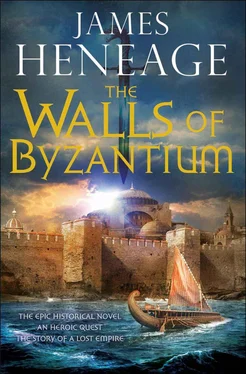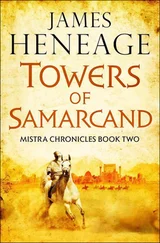James Heneage - The Walls of Byzantium
Здесь есть возможность читать онлайн «James Heneage - The Walls of Byzantium» весь текст электронной книги совершенно бесплатно (целиком полную версию без сокращений). В некоторых случаях можно слушать аудио, скачать через торрент в формате fb2 и присутствует краткое содержание. Жанр: Исторические приключения, на английском языке. Описание произведения, (предисловие) а так же отзывы посетителей доступны на портале библиотеки ЛибКат.
- Название:The Walls of Byzantium
- Автор:
- Жанр:
- Год:неизвестен
- ISBN:нет данных
- Рейтинг книги:3 / 5. Голосов: 1
-
Избранное:Добавить в избранное
- Отзывы:
-
Ваша оценка:
- 60
- 1
- 2
- 3
- 4
- 5
The Walls of Byzantium: краткое содержание, описание и аннотация
Предлагаем к чтению аннотацию, описание, краткое содержание или предисловие (зависит от того, что написал сам автор книги «The Walls of Byzantium»). Если вы не нашли необходимую информацию о книге — напишите в комментариях, мы постараемся отыскать её.
The Walls of Byzantium — читать онлайн бесплатно полную книгу (весь текст) целиком
Ниже представлен текст книги, разбитый по страницам. Система сохранения места последней прочитанной страницы, позволяет с удобством читать онлайн бесплатно книгу «The Walls of Byzantium», без необходимости каждый раз заново искать на чём Вы остановились. Поставьте закладку, и сможете в любой момент перейти на страницу, на которой закончили чтение.
Интервал:
Закладка:
Then, quite suddenly, they were there.
At the top of the slope, the wood ended and below lay a meadow halved by a tumbling brook. Stretching into the distance were fold upon fold of wooded hills with all their reds and yellows glowing like a pathway of embers towards the setting sun.
And there, pitched next to a little waterfall, was the tent that Suleyman had given her at her wedding. It was open on three sides.
She dismounted and walked slowly towards it and a delicate music came over the meadow to meet her. With it came servants who carried jugs of sweet wine and sherbet.
Anna entered the tent, sat on the cushions and watched the sun complete its progress to the west and she listened to the zither and thought of Mistra.
She thought of the Evrotas River twisting its way through the valley beneath the city walls. She thought of Mount Taygetos behind, always topped with snow. She thought of autumn in Mistra, of the St Adrian’s Day market where roasted chestnuts would be tossed from hand to hand as they cooled. She thought of grumpy praetors lighting the evening lamps along the narrow streets. She thought of her mother hanging tapestries on the walls of the triclinium against the winter cold. She thought of a little city on a hill that would, quite soon, fall to the Turks.
You can do a lot of good as wife of the Sultan .
The sun was almost set now behind the hills. It was a dazzling display of beauty put on by whoever’s God was up there, and its finale was an explosion of oranges and reds and yellows witnessed by an audience of tiny clouds basking in its brilliance.
Then all was violet and people with lamps appeared from nowhere to unroll the sides of her tent and to cast rose petals over her bed. A servant appeared at her side and refilled her glass with wine and another offered a plate of quail’s eggs and the roe of sturgeon. She ate and drank and wondered, with mild interest, when the Prince would arrive.
And then she thought of Luke.
Where are you? Where are you now?
He was as good as dead. She would never see him again. She closed her eyes and let the fatigue steal over her limbs. The questions came and went with images in their wake. Then they slowed and finally stopped on one single image that filled her mind as it had done every night for so very long.
Like this, she drifted into sleep, soothed by the lullaby of a zither.
She awoke suddenly. It was morning and she was in the bed and clothed in a gown of finest lawn. Someone had done this. A servant, she hoped.
She was aware that a voice had awoken her and it was a voice she knew.
Then she heard the voice of her future husband. He was talking to somebody close to the tent. But she knew it wasn’t his voice that had woken her.
There was a dressing gown hanging over a chair beside the bed and she quickly rose and put it on. She would not greet him from her bed. Her head was still heavy from the wine and the deep, deep sleep that had followed it and she found a little basin and splashed water over her face, blinking open her eyes.
Whose voice woke me?
Anna left the tent to find Suleyman outside but not the answer. The Prince was sitting at a table admiring the view. The horse from which he’d just dismounted was being led away by a groom and behind it followed a larger creature, stepping out elegantly. At its rein was a tall sipahi knight with gold mail and a gyrfalcon held high on his wrist.
Whoever had woken her was no longer there.
Anna walked over to the table and sat down. On it were bowls of fruit and dahl and honey and rose petals strewn between them and a small vase of lilies whose milky filaments bowed under orange stamens. For a while, neither of them spoke and the only sound was the gurgling stream and the music of morning birds.
Eventually Suleyman said, ‘I have brought a poet with me.’
‘A poet? For me?’
‘For us both. He will recite to us as we take our ease.’
‘But I want to ride. You’ve brought a gyrfalcon. We can hunt.’
Suleyman looked up from the peach he was quartering.
‘I told you,’ she continued calmly. ‘that I want to ride.’
Suleyman smiled and lifted the peach to his mouth. ‘And I want to listen to poetry. We disagree so soon?’
It was Anna’s turn to smile. ‘So let’s take the poet with us. Does he ride?’
At that, Suleyman laughed. ‘All right, we will ride. When would you like to go?’
Anna rose. ‘Now,’ she said.
Suleyman watched her for a moment; then he shrugged and rose and walked with her up the meadow, the long grass brushing their ankles. There was a little waterfall near the trees at the top and he knelt to fill his water bottle.
Then she heard it again. The voice that had woken her. It was within the trees.
She turned and walked up to the wood, leaving Suleyman at the stream. She entered the trees and peered into the sudden gloom and saw that he was standing there alone, his two eyes separated by a band of silver metal.
Eskalon .
He was the captain of the guard’s horse, the one she’d seen led away. His long nose was protected by a shaffron studded with jewels and at his haunches hung embroidered cloth of gold.
Eskalon .
She breathed his name and stepped forward as the great head came down to meet her. She lifted his chin and rested hers on the bridge of his nose so that they stared at each other, eye to eye.
‘Where have you been?’ she whispered, but she knew it was the wrong question.
His eyes were near to hers and they had tiny pools of light at their centre.
‘Where is he, Eskalon?’ she whispered.
The two pools moved a fraction as if the door to another world was opening. She looked into them and the trees grew still around her, the canopy above closing out the sun and birdsong. Then she was looking around a landscape of swirling gasses and there was someone coming out of the mist towards her, someone she knew, someone she still loved and who still loved her.
Luke .
The shape of him was vague but unmistakable. In a moment the face would appear and she was dizzy with longing. He drew closer and she lifted her arms to him.
‘Anna.’
It was Suleyman’s voice.
Anna turned to him.
He said, ‘You are pale.’
She took a deep breath, feeling the warmth of Eskalon’s breath on her neck. ‘Prince Suleyman, I want to offer you a wager.’
‘A wager? It is forbidden for me to accept wagers.’
‘And it is forbidden for you to drink wine and for your father to fornicate with boys from Trebizond but it happens. Call it a challenge.’
‘And it is what?’
‘A race. On horseback. You and me, back to the gates of Edirne,’ she said.
‘And the prize?’
‘If I win, this horse — which, by the way, I will ride.’
‘And if I win?’
She looked at him and her hand came up to touch the lily at her ear.
‘You win me,’ she said. ‘I will marry you without divorce. I will turn to your faith. You can have your red-haired heir within a year.’
CHAPTER TWENTY-FOUR
EDIRNE, OCTOBER 1396
In the Year of Our Lord 1354, an Islamic God had stamped his sandalled foot and the walls of Gallipoli fell like a camel sinking to its knees in the sand. A passing Ottoman war band then skipped into the fortress and so began the stream of Turkish men, women, children, sheep and saints that, ever since, had poured across the Dardanelles up into the fecund valleys of Thrace. Their ferries had been Venetian.
In that year, too, a philosopher called Plethon had been born in a city not far to the north. Adrianopolis, city of Hadrian. Now Edirne, city of Bayezid.
In that city, on the day following her race with Suleyman, Anna sat on a stone bench in a little courtyard made by Murad for his wife, the Byzantine Princess Gülçiçek Khatun, and stared at a pillar.
Читать дальшеИнтервал:
Закладка:
Похожие книги на «The Walls of Byzantium»
Представляем Вашему вниманию похожие книги на «The Walls of Byzantium» списком для выбора. Мы отобрали схожую по названию и смыслу литературу в надежде предоставить читателям больше вариантов отыскать новые, интересные, ещё непрочитанные произведения.
Обсуждение, отзывы о книге «The Walls of Byzantium» и просто собственные мнения читателей. Оставьте ваши комментарии, напишите, что Вы думаете о произведении, его смысле или главных героях. Укажите что конкретно понравилось, а что нет, и почему Вы так считаете.










